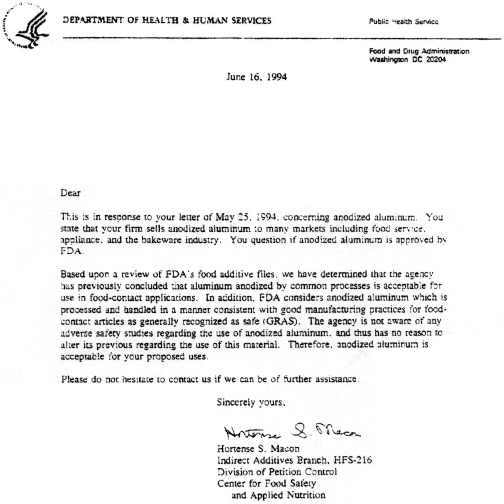
Curated with aloha by
Ted Mooney, P.E. RET

The authoritative public forum
for Metal Finishing 1989-2025

-----
FDA Approval for Black Hard Anodize
Can anyone find for me an FDA approval for black hard anodize for kitchen galley's. I have a customer who is wanting this to eliminate scratches and burn marks (mostly due to coffee pots).
Bill Freeman- Tulsa, Oklahoma
2003
2003
Bill,
I don't believe you will find any FDA approval on Black anodizing...as there is usually Chromium in the dyestuff, and the parts are also usually sealed in Nickel Acetate. If I recall correctly (from a previous letter to this forum) no-one could come up with any written "FDA Approval" even on clear, or "natural" anodizing.... even though this process is done on a substantial number of cookware products these days

Marc Green
anodizer - Boise, Idaho
First of two simultaneous responses --
Actually, I did happen to go thru this with one of the larger dye manufactures. We had a contract to hard anodize and black dye parts to be used for food service. After conversations with the customer and the dye manufacturer it was decided to go with a Clear Hard anodize and DI water seal. Although the FDA has not "approved" its' use expressly, it is "grandfathered" in and is used quite commonly for food service. As far as I know, no dyes have been approved by the FDA for food service and should not be applied.
Bill Grayson- Santa Cruz, California, USA
2003
Second of two simultaneous responses 2003
We do hardcoat on cookware often & I actually have an old letter from the FDA which I can supply copies of.
The summary of the letter, dated June 16, 1994 is:
"... FDA considers anodized aluminum which is processed and handled in a manner consistent with good manufacturing practices for food contact articles as generally recognized as safe (GRAS)..."
If Finishing.com wants to post it in its entirety they can email me.
David A. Kraft- Long Island City, New York
2003
Thanks for forwarding it, David! It may be a little old for someone else to hang their hat on, but at the very least it shows everyone where to go for any updates or clarification.


Ted Mooney, P.E.
Striving to live Aloha
finishing.com - Pine Beach, New Jersey
Read more:letter 10881 also addresses this topic.
Q, A, or Comment on THIS thread -or- Start a NEW Thread